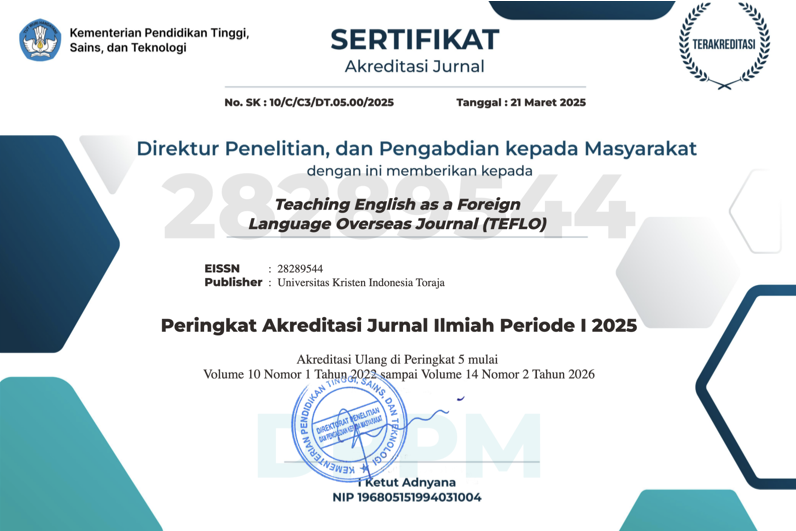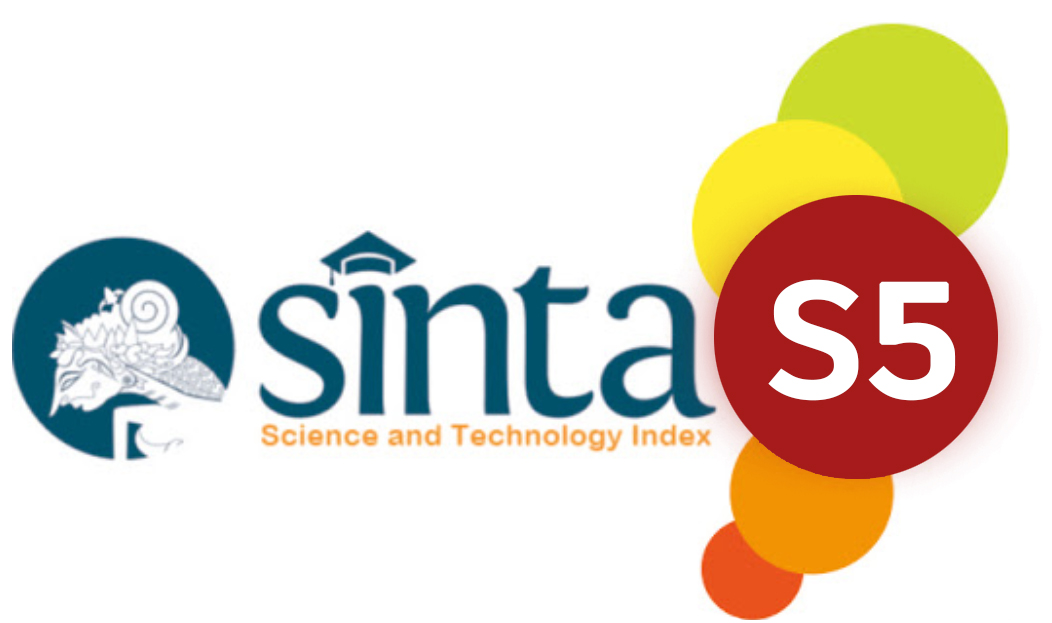IMPROVING STUDENTS’ VOCABULARY THROUGH SPOOF TEXT AT FIRST GRADE OF SMP NEGERI 1 SUNGGUMINASA
DOI:
https://doi.org/10.47178/3qw8we98Keywords:
Spoof Text, VocabularyAbstract
This study was to know the ability of students of SMP Negeri 1 Sungguminasa in mastering vocabulary by using spoof text. It was conducted at VII class of SMPN 34 Makassar academic year 2021/2022 as the subject of the study. This study is categorized as a collaborative classroom action research. The writer worked collaboratively with the English teacherin the class. The CAR was done based on Kurt Lewins’ design. The writer did two cycles in which each cycle consists of planning, acting, observing, and reflecting. The data were gathered through qualitative and quantitative data. The qualitative data was gained by analyzing observation result. Then, quantitative data were obtained from the students’ writing score of pretest and posttest. The finding of this study showed that there was an improvement on the students’ ability in vocabulary. It can be seen from the mean of pretest score was 60.31. Then, the mean of posttest cycle 1 score was 66.38 and the mean of posttest cycle 2 score was 75.31. In addition, there were 4 students (9.5%) who passed Minimum Mastery Criterion – Kriteria Ketuntasan Minimal (KKM) in the pre test. Meanwhile, in the cycle 1, there were 14 students ( 33.3%) who passed Minimum Mastery Criterion – Kriteria Ketuntasan Minimal (KKM) and it gained which was in the posttest cycle 2 there were 37 students (88%) who passed Minimum Mastery Criterion – Kriteria Ketuntasan Minimal (KKM), so the criterion of success was achieved. Related to the results of the gained data, it can be concluded that spoof text can improve students’ ability in vocabulary.
References
Famir, Muhammad. 2005. Belajar Kosa Kata Bahasa Inggris Melalui Metode Fun Game.Penelitian Tindakan Kelas. Takalar: SMP Negeri 1 Polombangkeng Utara
Harlina. 2012. Improving Vocabulary through Degree Of Comparison at SMP Negeri 31 Makassar. Skripsi.Unpublished
Ittaqi, D. M., & Indah, R. N. (2022). Storytelling of spoof text for the eleventh graders: advancing the beginner speaker. Jurnal Ilmiah Bina Bahasa, 15(1), 15-24.
Kamil, M. L., & Hiebert E. H. 2005. Teaching and Learning Vocabulary. New York : Guilford Press.
Lading, Rikardus. 2012. Increasing Student’s Vocabulary through Idiom Expression of the Fourth Semester Students of English Educational Departement University “45” Makassar. Skripsi.Unpublished
Pasa, A. E. (2018). The Use Of Dictogloss Technique On Students’ Achievement In Writing Spoof Text At Second Grade Of Madrasah Aliyah Muhammadiyah 1 Medan (Doctoral dissertation, Universitas Islam Negeri Sumatera Utara).
Rahmawati, Ikra. 2012. The Effectiveness of Using Card Media to Expand Students’ Achievement in Learning Vocabulary at SMP negeri 19 Makassar. Skripsi. Unpublished
Rasyid, M. Amin. The Vocabulary Selection of Modern In Light of Teaching English to False Beginners. Ujung Pandang : 1713PSDUP
Tahir, Muhammad. 1997. The Application of the Reading Method in Improving the Student Vocabulary Mastery at MAN 1 Ujung Pandang. Thesis Fakultas Tarbiah IAIN
Orianda, P., & Rosa, R. N. (2013). Teaching writing a spoof text by using series of pictures to senior high school students. Journal of English Language Teaching, 1(2), 445-454.
Yulandari, E. S., & Suryadi, H. (2022). Analysis Spoof Text Production Ability of Class XI High School Students with Problem-Based Learning (PBL) Approach. Journal of Languages and Language Teaching, 10(1), 36-45.













